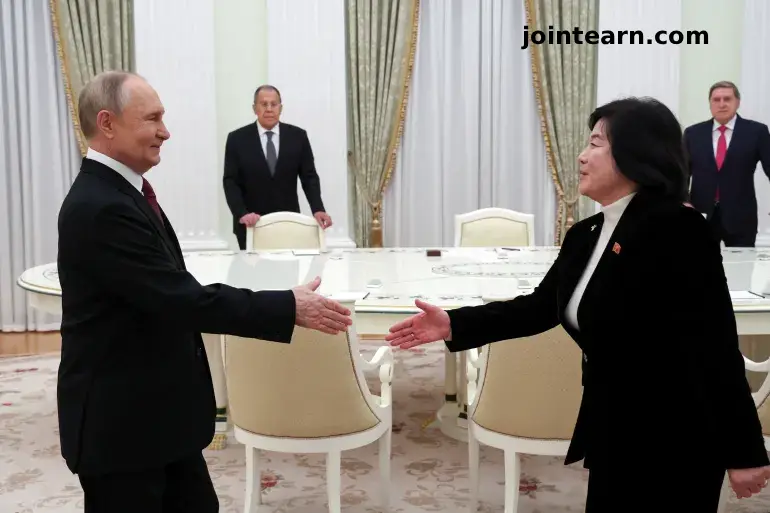
Moscow, Russia — Russian President Vladimir Putin has reaffirmed his commitment to expanding ties with North Korea, telling visiting Foreign Minister Choe Son Hui that relations between the two countries are “developing according to plan.”
The meeting, held Monday at the Kremlin, underscored Moscow and Pyongyang’s growing partnership amid shared isolation under Western sanctions and ongoing geopolitical tensions surrounding the Ukraine war.
Strengthening a Strategic Partnership
Video released by Russian state media showed Putin welcoming Choe and exchanging greetings alongside Foreign Minister Sergey Lavrov.
“Our relations and development prospects are progressing steadily and according to plan,” Putin said, extending his “warm regards” to North Korean leader Kim Jong Un.
Choe, for her part, praised what she called the “spiritual closeness” between Russia and North Korea, saying Kim “highly values the friendship and trust” he shares with Putin. She also delivered a personal message and “warm wishes” from the North Korean leader.
Deepening Military and Political Cooperation
The high-level meeting follows the signing of a 2024 defence pact that pledged both nations to provide mutual military assistance if either were attacked. The deal marked one of the most significant security commitments between Moscow and Pyongyang since the Cold War.
Since that agreement, North Korea has reportedly deployed around 10,000 troops to assist Russian forces in Ukraine, with approximately 600 casualties, according to estimates from Seoul and Kyiv.
Pyongyang publicly acknowledged its soldiers’ participation in April, claiming they played a “pivotal role” in helping Russian forces reclaim the Kursk region after a Ukrainian counteroffensive.
Earlier this month, Kim Jong Un inaugurated a museum in Pyongyang to honor fallen North Korean troops in the conflict, calling their deployment “the beginning of a new history of militant solidarity” with Russia.
“Our alliance with Russia is invincible,” Kim said at the event, framing the cooperation as a cornerstone of a new global order resistant to Western dominance.
Putin and Kim’s Growing Rapport
Monday’s meeting builds on a series of engagements between the two leaders. Putin and Kim last met on September 3 in Beijing, where they held bilateral talks following a military parade hosted by Chinese President Xi Jinping.
At that meeting, Putin praised North Korean troops for fighting “courageously and heroically” in Ukraine, adding:
“We will never forget the sacrifices made by your armed forces and the families of those servicemen.”
Their growing rapport reflects a broader alignment among Russia, North Korea, and China, as the three nations increasingly coordinate on diplomatic, military, and technological fronts.
Western Concerns and U.S. Reactions
The deepening Moscow–Pyongyang partnership has alarmed Western governments, particularly the United States, which accuses Russia of supplying advanced technology to North Korea, including assistance with satellite and missile programs.
U.S. officials have warned that such collaboration could accelerate Pyongyang’s weapons modernization and undermine UN Security Council sanctions.
After the Putin–Kim meeting in Beijing, U.S. President Donald Trump accused the two leaders of “conspiring against U.S. interests,” though the Kremlin dismissed his comments as “politically motivated rhetoric.”
Analysts: Alliance Driven by Shared Isolation
Experts say the tightening Russia–North Korea relationship is driven by strategic necessity. Both nations face crippling Western sanctions — Russia for its invasion of Ukraine, and North Korea for its nuclear weapons program.
“Moscow needs manpower and ammunition for its war, while Pyongyang needs food, fuel, and technology,” said Andrei Lankov, a Seoul-based expert on North Korea. “It’s a pragmatic alliance wrapped in ideological rhetoric.”
Meanwhile, Beijing’s cautious support provides both countries with additional diplomatic cover, even as China maintains a delicate balance between its partnerships with Russia and North Korea and its global economic interests.
A Growing Axis of Resistance
The Kremlin meeting marks another step in what analysts describe as the emergence of a “Eurasian axis of resistance” — linking Moscow, Pyongyang, and Beijing in opposition to Western-led security blocs such as NATO and the U.S.–South Korea–Japan alliance.
While the full scope of the partnership remains unclear, recent developments — from troop deployments to shared defense commitments — suggest that Russia and North Korea are increasingly viewing one another as vital strategic partners in their confrontations with the West.


Leave a Reply